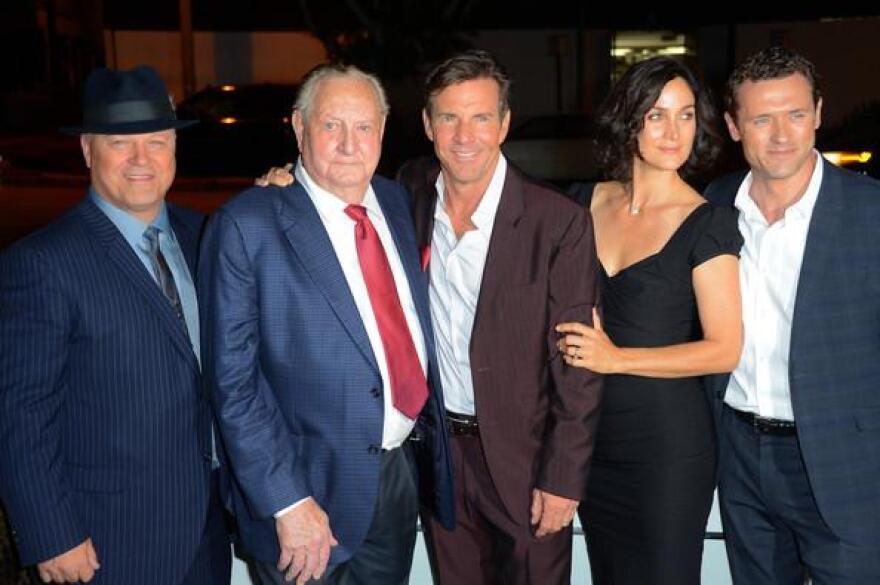Ralph Lamb died Friday at the age of 88.
Lamb began his career as a Las Vegas sheriff’s deputy in 1947. That was the same year the Flamingo, whose construction was overseen by Bugsy Siegel, was being completed.
One of 11 kids who was raised in poverty in Alamo, Lamb rose quickly through the ranks. But he quit the sheriff’s department to become a private detective. His most famous client was billionaire Howard Hughes.
In 1961, the Clark County Commission appointed him sheriff. He held the job until 1979.
Over the years, Lamb’s run-ins with the mob were so sensational many believed them urban legends. Some of them became part of a television series based on Lamb's life as sheriff.
Longtime Las Vegas television reporter George Knapp was collaborating on a book with Lamb. He was with the former sheriff in the final days before his death. He talked to KNPR's State of Nevada about Lamb's legacy and legend.
"Two things come to mind. One is absolute fearlessness. He would stand toe-to-toe, eyeball to eyeball with bad guys mobsters, bikers, pimps all kinds of really bad hombres," Knapp said, "The second thing was intelligence. He came from humble origins, wasn't an educated man but he was brilliant."
Knapp said many of the sensational stories about Lamb, like the one that he dragged Murder Inc.'s Johnny Roselli out of a coffee shop on the Strip, are true.
It is also true that Lamb made The Beatles come to his office to be photographed and fingerprinted, because to perform on the Strip they needed a sheriff's work card.
During the 60s and 70s, Ralph Lamb and his brothers, Floyd and Darwin Lamb, accrued a lot of power, from the outside it was described as a dynasty. Ralph Lamb shied away from that label.
"Ralph Lamb insists he didn't like it," Knapp said. "He didn't like to talk about the dynasty. He felt his brothers came in on his coat tales."
Despite the power Lamb had in the state, according to Knapp, his true love was rodeo.
"He had a secret hideaway," he said. "He would get all of his business done in the morning and then, if you wanted to find the sheriff in the afternoon, it was his own little rodeo."
Lamb taught some of the biggest names in the Las Vegas valley to rope and ride, including casino mogul Steve Wynn.
"And from what the sheriff told me, he became pretty good at it," Knapp noted.
Lamb lost his top cop status in 1978 after beating a tax evasion charge.
According to Knapp, the federal government believed that most, if not all, Las Vegas officials were crooked.
"They assumed everyone was bad in particular the Lamb family," Knapp explained. "They went after Floyd Lamb and they got him, years later. They targeted Ralph, thinking that he was living above his means."
However, the federal government did not have the evidence it needed to convict him. Despite avoiding a conviction, the trial hurt Lamb's reputation ahead of the election.
"It was front page news everyday of the trial leading right up to the election and that was enough to do him in," Knapp said.
He tried again for office in 1994, but he lost to Jerry Keller.
For Knapp, Lamb had a big impact on law enforcement in the Las Vegas valley.
He helped consolidate the Las Vegas Police Department and the Clark County Sheriff's department to create the Las Vegas Metropolitan Police Department.
Lamb also brought the department into the 20th Century by creating the SWAT team and integrating the police force.
Knapp also credits Lamb with the creation of the work card program, which was originally designed to track mafia members working in casinos, but is still used today for certain jobs within a casino.
Although, he will be known as a man who helped shape modern Las Vegas, Knapp believes Lamb would want to be remembered for something more personal.
"I think he would want to be remembered as a man who lived up to his word and was good to people," Knapp said.
For Knapp, Ralph Lamb's death is, in a sense, the end of old Las Vegas.
"It is certainly an end of an era. The old cowboy Las Vegas I think it means it's finally gone," Knapp said. "It's a sad day. It's a sad passing. Ralph Lamb was a great man."
George Knapp, chief I-Team investigator, KLAS-TV, Channel 8



